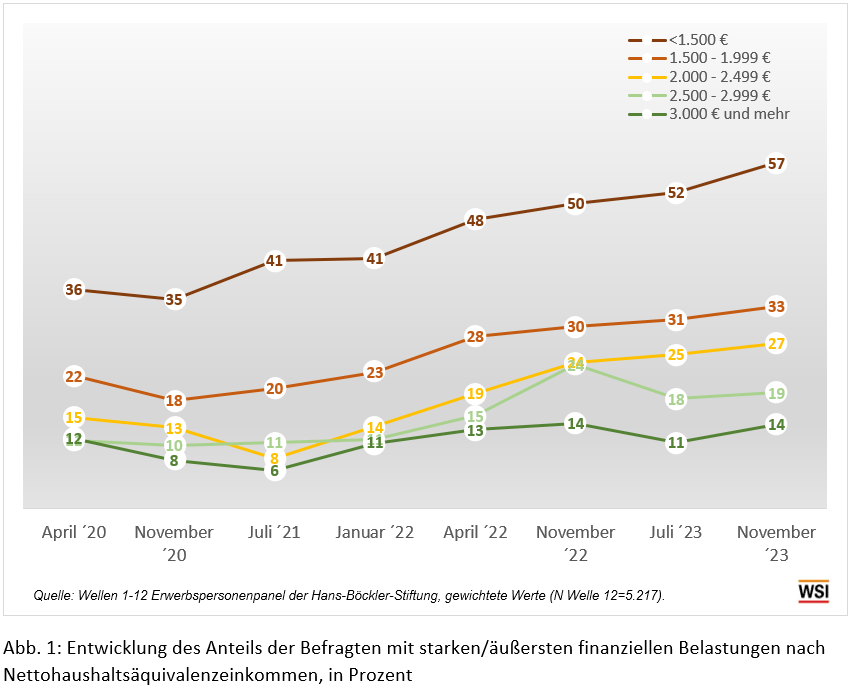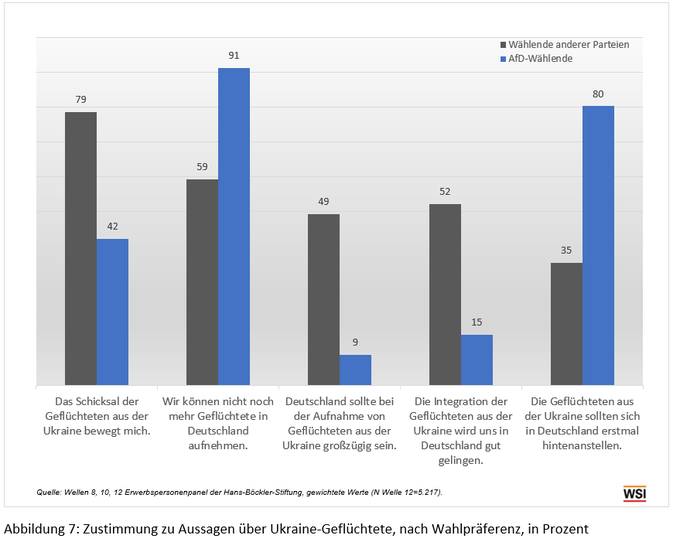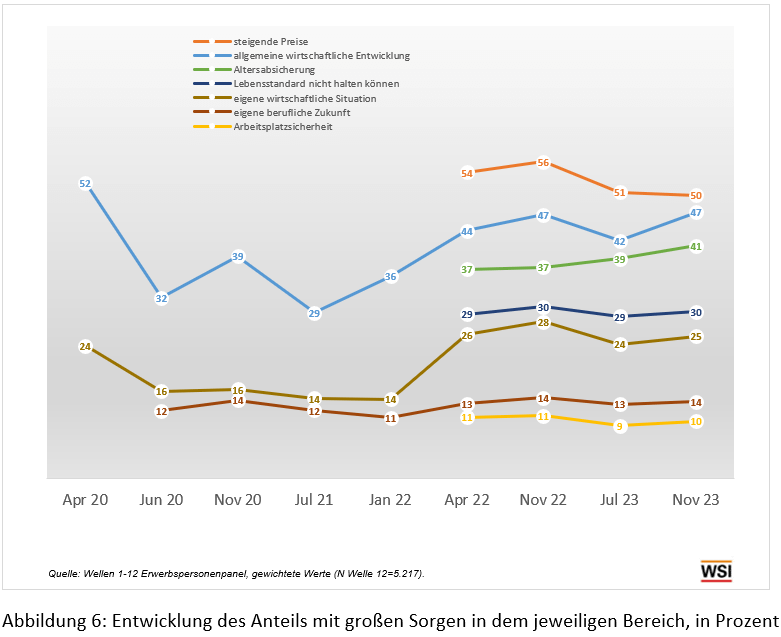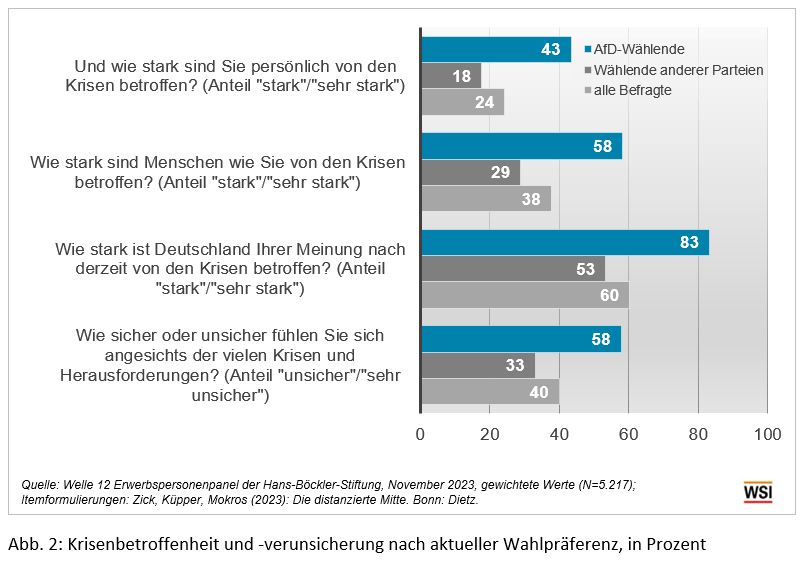- Once again, there is a great deal of uncertainty resulting from widespread financial uncertainty. Burdens – especially affect these lower income groups.
Finance. Worries are also widespread and are at a consistently high level. Professional worries, on the other hand, are hardly widespread.

2. Society-related concerns continue to rise. Around half of them now express great concern about soz. cohesion of society or development soz. Inequality – a continuous increase since the beginning of the pandemic and also signs of increasing uncertainty.

3. The financial burdens and worries also feed to a considerable extent the low level of trust in the federal government and the AfD’s voting intentions, which increased slightly again among the working population between July and November ’23 (from 23 to 24%).

4. After trust in almost all institutions declined immediately after Russia’s attack on Ukraine, many other institutions are now stabilising a year and a half later.
Bettina Kohlrausch on this finding: “Even in turbulent times, one should not lose sight of the fact that society has resources that stabilize it. It is important to strengthen these resources and counteract destabilizing developments, especially the heavy burden on the lower income groups, which continues to have an effect despite falling inflation. […] “To this end, it is also necessary to make it clear that the crises can be shaped by state action. Debates about the withdrawal of the state, for example in social policy, are counterproductive here.”

5. A look at AfD voters shows that they are far more likely than voters of other parties to say that they themselves and Germany as a whole have been severely affected by crises in recent years. AfD voters also often feel insecure and express great concerns.

6. The fact that AfD voters are more affected by the crisis is not due to a disadvantageous social structure. Composition: Even with comparable incomes, AfD voters are much more likely to be affected by crises and are more likely to be insecure and worried than voters of other parties. The differences are enormous: AfD voters from the highest income groups are more likely to feel insecure or financially worried than voters of other parties from significantly poorer income groups. It is very important to look beyond these general correlations at significant differences in individual crisis responses: Regardless of their actual financial situation, AfD voters feel more affected and unsettled by the current crises than voters of other parties. Obviously, the AfD is particularly successful in mobilising and reinforcing crisis-related uncertainties and burdens. This is a worrying finding, because such a strengthening of anti-democratic forces poses a serious threat to our democratic social order.

7. Trust in institutions also continues to be significantly lower among AfD voters than among voters of other parties. This applies to trust in all the institutions surveyed, but especially to trust in the Federal Government and the public media. Exception: trust in the preferred party. This is above average among AfD voters: 51% express great/very high confidence here – among voters of other parties, the average is 41% who express such great trust in their preferred party. This shows the turning away and pronounced alienation of many AfD supporters from central democratic institutions, while the AfD is the only institution that is trusted by a majority. On the one hand, this shows the considerable dissatisfaction of AfD supporters. On the other hand, however, it also becomes apparent how successful the AfD is with its voters in painting the picture of a chaotic and failing system and positioning itself as the only saviour.

8. Finally: attitudes towards people who have fled to Germany from the war in Ukraine. Between the beginning of the war and November ’23, they became significantly more pessimistic, critical and negative among all respondents.

9. For all items surveyed, AfD voters are far more hostile to Ukrainian refugees than voters of other parties. Among them, 4 out of 5 demand that refugees from Ukraine “should take a back seat” in Germany for the time being. The ongoing debates about a tougher approach to dealing with refugees are increasingly reflected in processes of desolidarization. At the same time, the feeling among AfD voters that they are being neglected when it comes to refugees and that they are demanding established privileges in the sense of “us first” seems to be spreading enormously. Overall, the attitude pattern of AfD voters here shows how much the topics of refugees and integration emotionalize and mobilize them.

The full press release on the findings (in German) can be found here: https://www.boeckler.de/de/pressemitteilungen-2675-deutsche-gesellschaft-verunsichert-aber-nicht-erschuettert-59064.htm
Data basis: W12 of the WSI Labour Force Population Panel (N=5,217), which has regularly surveyed the same labour force since the beginning of the pandemic. Offline recruited Online Access Panel (CAWI) from VERIAN (formerly KANTAR). The sample adequately reflects the working population according to characteristics such as age, gender, state and education.

